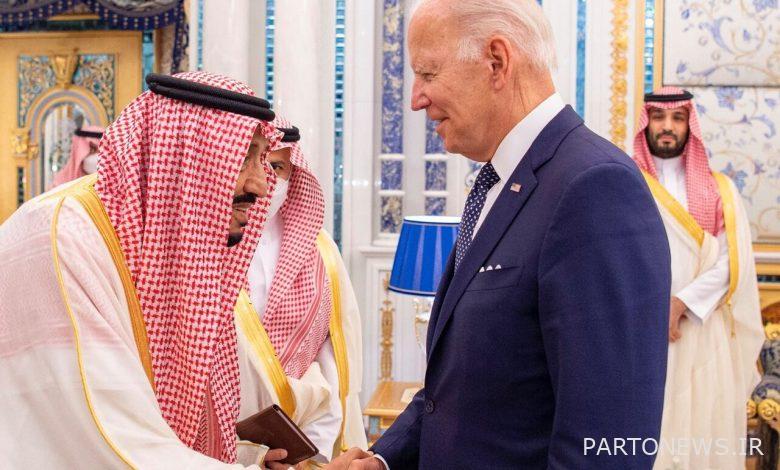The latest weighing of oil and security in the Middle East

“Jeddah and the consequences of Biden’s trip to Saudi Arabia for Iran and the region” The title of the meeting was held by the Saudi Studies Group and Iran Studies Group of the Iranian Association of West Asian Studies in collaboration with the House of Humanities Thinkers. “Mehdi Alikhani” assistant professor of the university and head of the Arabia group of the Iranian Association of West Asian Studies As one of the speakers in this meeting, he made the following remarks:
Documentary functions with the title Shia Crescent
Alikhani points to the developments of 2005 and 2006 in the Middle East region and says that these developments caused the existing balance to be disturbed in terms of identity and geopolitics. Some Arab governments tried to dissuade the United States from pushing for reforms in Arab countries by bringing up the “Shia Crescent” issue as a ploy to pretend that Iran and its allies are the threat and not the Arab countries.
Since 2011 and with the fall of Hosni Mubarak in Egypt, the process of mistrust of the Arab countries to the United States intensified, and Saudi Arabia decided to reduce its dependence on Washington.
The Shiite crescent debate and the disruption of balances led to the formation of new alignments in the region; The effort of the Arab side was to organize this alignment around the axis of Shia and Sunni, and Iran also wanted to mention this alignment in the form of resistance and compromise.
The impact of the 2011 unrest in the Arab world
According to Alikhani, while efforts were made in the region to re-establish the balance that had been upset, in 2011 unrest occurred in countries such as Egypt, Bahrain, Saudi Arabia and even Yemen, and caused the historical window of vulnerability of Saudis in Yemen again. be activated and the concern of Saudi Arabia and the conservative countries of the region will increase.
With these developments, the weakening of Saudi alliances was taking place, and they, in connection with Iran, tried to restore the balance through the weakening of the Shia government in Iraq and the fall of the Syrian government through terrorist groups that were supported by some Arab countries. . Of course, the policy of weakening the Iraqi government continued to change its direction politically and economically to attract the Iraqi government. For example, on the sidelines of the Jeddah meeting during Biden’s trip to Saudi Arabia, there was a scientific discussion about the connection of Iraq’s electricity grid to Saudi Arabia and the member states of the Persian Gulf Cooperation Council.
Regarding the coordination of the conservative Arabs in the region against Iran, this coordination was not limited to the Arabs, but the Israelis also sided with the Arabs and established a secret coordination with each other, which was also revealed in the WikiLeaks documents.
The equation of oil versus security has changed for Saudi Arabia and the United States
Referring to the proposition that the relations between the United States and Saudi Arabia is a transaction, namely oil versus security, Alikhani believes that this equation has changed.
In the recent period, there has been a relative balance in energy production and consumption in the United States, and the equation of oil versus security does not apply to Saudi Arabia as in the past.
In the recent period, there has been a relative balance in energy production and consumption in the United States, and this country has been able to find a wider field of action in relation to the current conditions in energy and oil policies than in the past. For example, when Barack Obama imposed sanctions on Iran, these sanctions happened gradually and Iran’s oil exports decreased every six months, but during the Donald Trump era, due to the balance that had happened in this country, he raised the issue of zeroing oil exports. . So this equation, oil is not used for security as in the past.
Currently, the issue of security is not limited to the Saudi family in Saudi Arabia, but it is important to preserve the conservative families aligned with the West and America in the region. This point was somehow mentioned in the final joint statement of the meeting between the Crown Prince of Saudi Arabia and Biden. In this deal, Saudi Arabia plays a central role both in terms of spiritual position and oil position.
With the first fall, mistrust of America intensified
In the developments of 2011 in the Arab countries, America left Hosni Mubarak behind in Egypt, and from the perspective of the Arabs, this meant the beginning of distrust in America. Because of this, the internal movements of the Arabs intensified. Therefore, since then, Saudi Arabia decided to reduce its dependence on the United States and began to have relations with powers such as China and Russia.
The weight of oil in Biden’s recent trip to the region
At the end of his speech, this university professor points to the new developments in the region and notes that with the developments in Ukraine, the oil issue became prominent again. At first, Saudi Arabia and UAE ignored the demand of Westerners to increase oil production and export. Therefore, oil played an important role in Biden’s trip, and after that there were issues such as the security of the region and Iran.
Consultations were held during Biden’s trip to Saudi Arabia, and before that, Biden had also visited Israel. All this shows that the balance that was disturbed in the past in the region is being formed with a new order and an identity and geopolitical balance.

